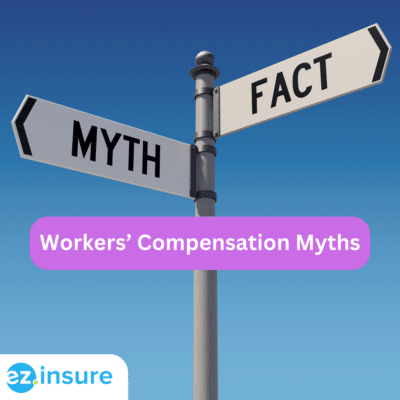
Myth 1: Small Low Risk Businesses Don’t Need Workers’ Compensation
In most states, workers’ compensation insurance is required by law, and many require it as soon as you hire your first employee. It’s important to understand your state’s requirements to avoid compliance issues. Businesses that choose not to carry workers’ compensation insurance despite being required to may be subject to severe penalties and fines. Additionally, injuries can occur even in low-risk industries, so you should be covered no matter how safe your job is. Not to mention, the costs associated with work-related injuries, including medical expenses and lost wages, can build up quickly especially if you don’t have proper coverage. Having a proper workers’ compensation insurance policy in place will protect your business from all angles.
Myth 2: I Only Have A Couple Employees, I Can Pay Out Of Pocket For An Accident

So for smaller businesses this might not be a viable option. There are even some states who won’t even allow companies to self-insure. And even if your state does allow it you have to apply for the permission to self-insure. Which includes state-specific requirements for example you could have to prove you have a networth of at least $500,000 among other things. Essentially you have to prove you can foot the bill for any and all workers’ compensation costs for every employee that you have.
Myth 3: I Don’t Have Employees, I Use Subcontractors So I Don’t Need Coverage
When you bid on a job your possible client may request proof of workers’ compensation insurance for yourself and any subcontractors who will be working with you. For instance, if you are an electrician and bid on a wiring job for a school, the school will need to know that you and your team all have coverage before they’ll even consider your bid. If you don’t have coverage and you or a crew member are injured on the job, your health insurance can deny coverage because it’s a work related injury. Many health insurance policies will not cover these types of injuries.
At most you can buy yourself a workers’ compensation policy and require any subcontractors you hire to have their own valid policy. Before your team begins working make sure that they have a valid certificate of insurance. If they don’t, and they get injured, you may be held responsible for any injuries which is a huge financial risk.
Myth 4: Seasonal Businesses Don’t Need Coverage
You need the insurance while your business is operating. The majority of insurance companies will write you a seasonal business policy, so long as you clearly define your open and closed period. For example if you have a pool cleaning/maintenance business and only operate between April and October, your insurance company will activate your service in April and pause it in October. That way you are covered while you’re open and don’t have to pay premiums when you’re closed.
Myth 5: I Only Employ My Family Members, I Don’t Need To Cover Them.

Myth 6: My Employees Work From Home They Don’t Need Coverage
You may believe that workers’ compensation does not apply to home-based employees because you cannot control their working conditions. However, that is wrong. You are still obligated to provide a safe workplace for employees. Even if they work from home or a remote location just as you would for an employee who works on site. All employees are entitled to workers’ compensation benefits. Although home-based employees might have a harder time proving that their injuries are work related.
Myth 7: If My Employee Doesn’t File A Claim The Day Of The Injury They Can’t File It Later
There are numerous reasons why an employee may delay filing for workers’ compensation. For example, if your employee slips and falls while moving boxes. The employee might get up and feel a little sore but otherwise fine. But over the next week or so their back becomes increasingly stiff and painful. They go to the doctor and the doctor informs them that they actually have an injury, and it was most likely due to their fall and continuing to move boxes has only made the injury worse. Even though your employee did not immediately report the fall, they are still eligible to file for workers’ compensation. Every state has a statute of limitations for how long your employee has to file a claim. So just because they didn’t file that day doesn’t mean they can’t still claim.
Myth 8: Worker’s Compensation Stops Employees From Suing

Myth 9: If The Accident Is The Employee’s Fault They Can’t File A Claim
This is another common misconception about workers’ compensation insurance, but it’s mostly untrue. The misunderstanding likely comes from you confusing workers’ compensation claims with a personal injury lawsuit. It is true that in order to file a personal injury lawsuit, the employee’s injuries had to have been the company’s fault. But that isn’t the case with workers’ compensation. Workers’ compensation is mostly no-fault. Meaning if your employee has a work related injury or illness, they are eligible to file a claim. Regardless of who was at fault. It makes no difference if you believe they should have been paying more attention or could have avoided the accident. The only exceptions to the workers’ compensation no fault rule is if your employee was under the influence of drugs and alcohol at the time of their injury. Or if they intentionally hurt themselves to attempt workers’ compensation fraud.
Myth 10: I Don’t Need An Insurance Agent To Get The Best Policy
This is a difficult myth; a do-it-yourself approach could lead to costly errors. Despite the fact that there are several online tools and carriers that can help you buy a policy. But they can’t help with everything the way an agent can. For example, if you fill your application out and select the wrong classification code for your employees. You will end up owing a massive fine at the end of the year audit. Or your insurance provider could deny you coverage due to the misclassification or other error. We highly recommend consulting with a licensed agent who specializes in workers’ compensation insurance. They will recommend the appropriate coverage and guide you through the process step by step.
Here at EZ, we connect you with your own personal insurance specialist who can quickly compare plans available in your area all while staying within your budget. And they do it all for free! That’s right none of our services cost you anything. Our only goal is to make sure you get the best workers’ compensation coverage, and any other business insurance coverage for that matter. To get started, enter your zip code in the box below or call 977-670-3538 to speak with an agent today.
